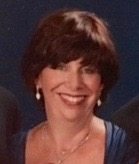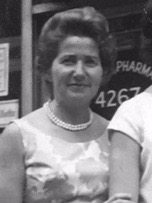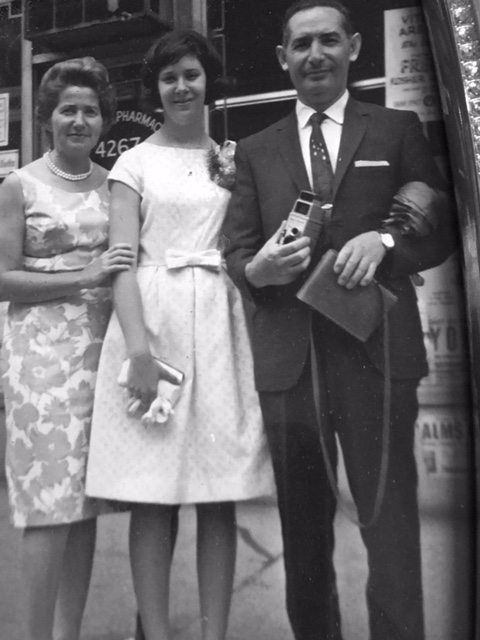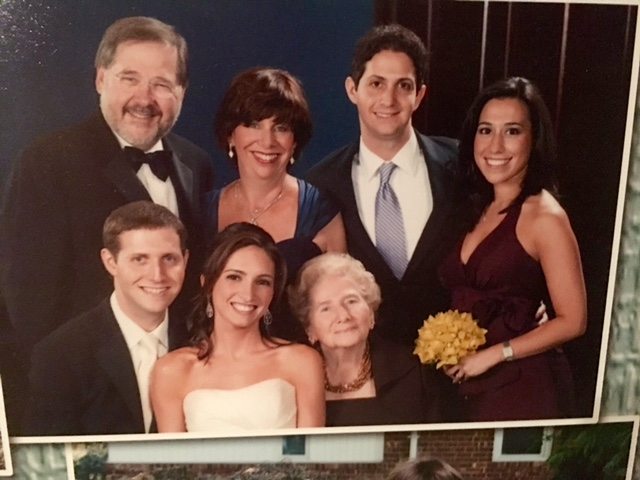For Decendant Submission, Select Remembrance
"REMEMBRANCE OF MY PARENTS," BY SUSAN HOROWITZ
We, my sister and I, grew up in a European home. Everyone in our family and extended family (those we called “Tante,” even though they weren’t blood, and their children who were our “cousins”) looked and sounded the same. I never knew my parents had accents, until someone pointed it out to me years later. When my sister and I went, for the first time, to a reunion of the Kindertransport, my sister pointed out, specifically referring to the women’s hair styles, “Everyone looks like Mommy.”
We didn’t have grandparents (although we did have Tante Anni, my mom’s aunt, the closests and next best thing), and had nothing that had been handed down within generati8ons of the family. My mom’s mom died in Auschwitz. My dad’s parents went to Palestine, with his younger brother. My parents, with the help of my small savings account, finally saved up to go to Israel in 1962. My dad hadn’t seen his parents or brother since before the war. We were on a chartered flight. We got word (Western Union telegraph) that my Opa died six weeks before our scheduled visit. It was the only time I saw my father cry. It was my only two weeks with my Oma. I didn’t really bond. I was twelve.
My father died in 1966 at the age of 44. It was our personal tragedy, and another loss for my mom, who had already lost so much. My dad was the one and only love of her life. He was her best friend and her security blanket. He was the family she had lost. She, and we, never recovered. A cousin wrote letters to my Opa in my father’s name. She died soon after, never knowing that her eldest son had predeceased her.
Since I was sixteen when my father died, I never knew him from more than a child’s perspective, which, try hard as a might to hold onto the memories, does fade. I grew up with my mom.
We learned stories of the Kinderstransport, an organization she identified with, and was engaged with until her death.. She left Vienna at age fifteen, a teenager thinking she was going on an adventure. The war had just broken out, and the family that was to receive her did not show up. She was alone in a strange land, not speaking the language. At the beginning, she got letters from her mother asking if she had a winter coat, obviously worrying about her. Then, the war raged, and the letters stopped. She didn’t know she would never see her mom again. But I think her mom knew. What brave mothers and fathers they were. How we cry sending children off for a fun time at camp – different worlds, different sensibilities.
I went into the field of psychotherapy. My mother, always proud of me, but never showing it, had mixed feelings. She used to say “We never had time for therapy. We had Hitler.”
My mother never seemed happy, but always said she was content. She never asked for anything and didn’t really want any of the things I tried to get for her to make her life easier. She could walk into a newly furnished room and point out that a picture was crooked. If she commented about an article of clothing “Is that new?” it meant she didn’t like it, which was often. She was highly anxious, but only about us. She was like a “herder,” always wanting to know that the sheep were safe at home. If I travelled by myself or drove my car great distances, she would say “You drive like a man,” meaning women were not supposed to do such things. She wasn’t fun like other parents, and she didn’t teach us to walk with confidence, but we knew we were loved.
My mom did the Speilberg interviews, but didn’t know how to tell her story. She was in an Austrian produced movie called “Vienna’s Lost Daughters.” It wasn’t very good, but we were proud of her and went to the opening in Vienna and showing in New York City. In a restaurant in Vienna, although she spoke perfect German, my mother said “Tell the waiter we need more butter.” It brought me back to being a six year old, when she said “Call 411 (the Google of the time) and ask ….They won’t understand my accent.” I was definitely parentified, although there was no name for it at the time. We did what we had to do and the world wasn’t as child oriented. My dad worked six days a week, and on the seventh day, of every week, we went downtown to have dinner with my Tante Anni and Uncle Yup. We just hung out, talked and ate. We had no other children to play with or activities to engage us. My dad never complained about doing this on his one day off. The children were never were bored.
Mom would say “Shoot me before you put me in a nursing home,” since the time she was forty years old. She always seemed old to us, yet of course, she was young, as well. When she suffered a severe stroke at the age of 91 and a half, her worst nightmare came true, and she was unable to take care of herself. She spent the next five weeks, thankfully, for her, only five, at my sister’s home in Long Island, lovingly cared for. She died unpeacefully, after children and grandchildren were able to say their goodbyes. She had three great grandchildren, and there were three more that she would never meet. Not one to ever complain, she died never having regained her voice with which to legitimately complain after the devastating stroke. We tried as best we could to give her a dignified and loving send off. I hope she heard us and knew she was loved, as we knew she had loved us all the years she was able to. I hope there is a heaven so she can once again be together with my dad.






